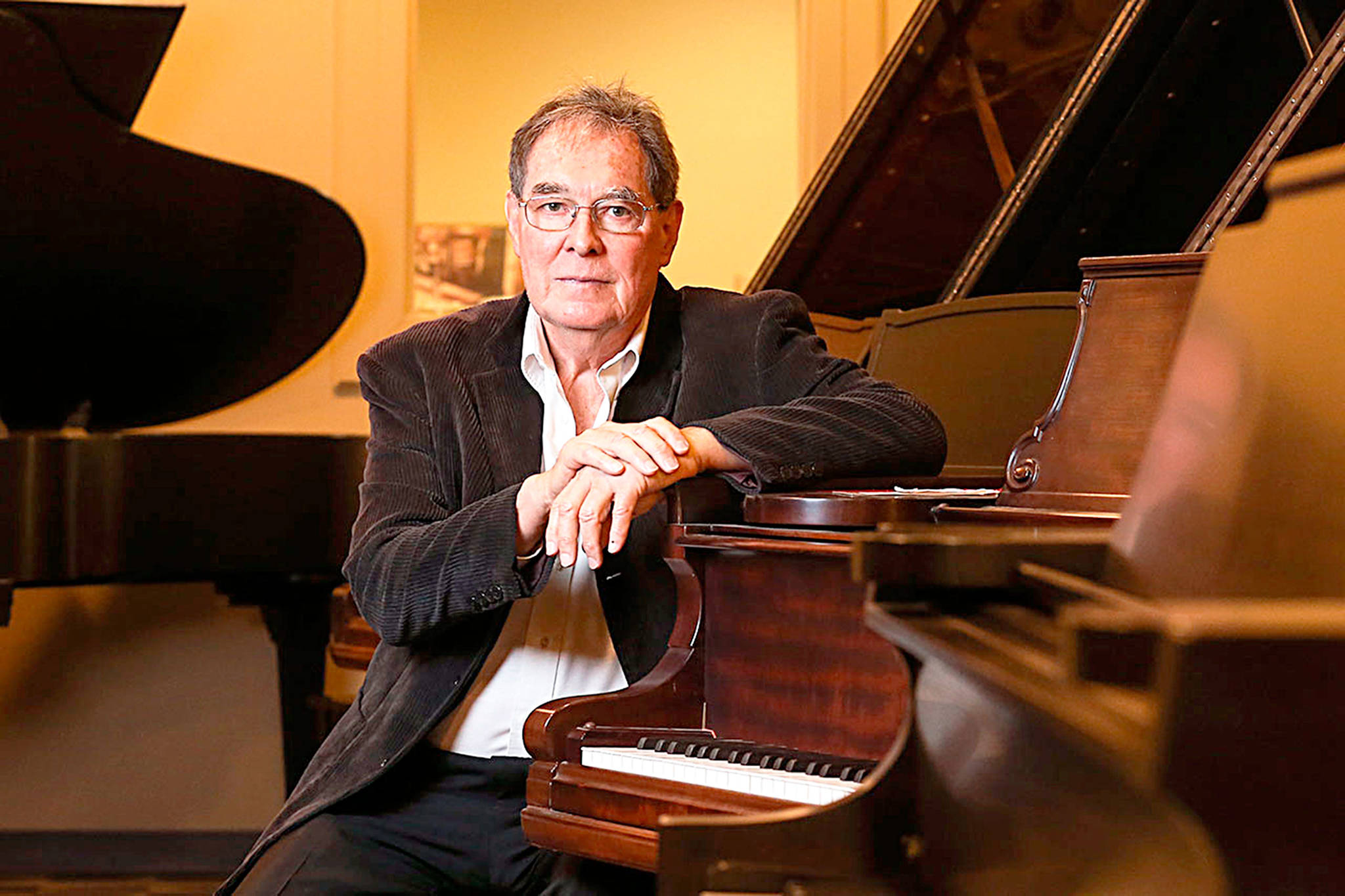Lloyd Boyd became a piano man by default.
And probate court.
He doesn’t play piano, read music or whistle any recognizable tune.
But he’s a natural salesman, which is handy since he needs to sell a showroom.
The 79-year-old Coupeville man inherited 40 restored vintage grand and upright pianos — including a stunning nine-foot concert Steinway — when his younger brother, Ronald Boyd, died last year.
Most of the collection is up for sale and on display in the former Everett Symphony Orchestra building, 2710 Colby Ave.
Boyd rented the 3,700-square-foot space in the art deco building last October. He’s had one open house, which included a recital and explanation of piano parts by Nathan Jensen, a Shoreline piano tuner hired by Boyd to “triage” the collection.
“By and large, they are in very good condition,” Jensen said.“ Seeing that many Steinways together is quite something. I played them all. I felt like a bull in a china shop.”
Beside the dozen or so Steinways are a Chickering grand, Henry Miller upright, some Mason & Hamlins, a Baldwin, Knabes and Yamahas.
In general, pianos need tuning every six months, Jensen said. So when they’re up in years and been in storage, it’s takes a lot of tickling to tune up. Mostly, it’s the piano plate that needs replacing, costing $15,000 to $20,000.
Boyd shows the pianos by appointment. He’s placed five on consignment in Bellevue and sold a few, including one that will reside in an Arlington church. He knows it will take true aficionados to purchase the high-priced polished wooden beauties.
The nine-foot concert Steinway sells for about $150,000 new, Boyd said. “It’s priced at $50,000. The other Steinways are in the $20,000 to $30,000 range.”
Boyd now knows the subtle difference of pianos from around the world, such as a Petrof (made in Czech Republic) and a Samick (South Korean.)
“He’s been researching pianos, their parts and prices and he plays some, too,” Jensen said.
Not true, demurred Lloyd Boyd, who at times is as playful as his name suggests.
“The only piano I can play is one with a CD disc,” he laughed. “I can do that. That’s my specialty.
“I can play classical music on it and I can play spiritual. But if anyone wants to hear me play, they have to do it by appointment.”
Never, he says, did he expect to be executor of an estate of such musical magnitude.
“Ronald had a large enough RV garage and all the pianos were on their sides and wrapped in canvas,” said Boyd, who has three adult children with one daughter living in Everett. “I didn’t have any idea until I went in there.”
Lloyd took on the task, he said, because his brother had “no will, no heirs.”
Jensen says Boyd is up to the task.
“He’s a natural salesman. Now it’s just a matter of learning how to sell pianos.”
The Boyd brothers lived on Whidbey Island as kids. In the late 1940s, the family moved to Arizona.
As adults, they went their separate ways, Lloyd to California to sell real estate and Ronald to Washington D.C., after being drafted into service for Operation Whitecoat at Fort Detrick, Maryland.
Ronald Boyd went from learning how to tune pianos in Phoenix as a teenager to owning five stores in the Washington, D.C. area that specialized in buying, selling and restoring pianos.
“He was into vintage pianos, rebuilding, refurnishing and returning them to glory,” Boyd said.
They both decided to retire on Whidbey. But Ronald Boyd died at age 74 after suffering a stroke at his Arizona home.
He had already shipped his possessions to Whidbey.
“The last time I saw him was June 2016 in Arizona, he was trying to recover from his stroke,” Boyd said. “He was only here on Whidbey a few months. He bought the house for retirement and had all the pianos and sewing machines packed up in two 18-wheelers.”
The industrial sewing machines were used to make huge canvas piano covers (there are 100 of those.) Plus there are new and old piano benches, piano dollies for moving and, of course, boxes of piano sheet music.
Ronald also left behind a few vehicles, including a Cadillac, van and motorcycle.
Ronald preferred the cello and played in an ensemble, Boyd said.
“I didn’t know him that well to be honest,” Boyd admitted. “I’m sure he was going to continue working on the pianos in retirement but he never told me. He was a very private person.”
Lloyd Boyd is a volunteer chaplain at WhidbeyHealth Medical Center once a week, where he visits patients and offers comfort to families.
His brotherly duties are time-consuming and challenging, involving moving trucks and precious, expensive cargo the size of small cars. But he’s gotten to know his brother better through his possessions.
Ronald Boyd was born in Freeland in 1942 in a house that’s since been torn down.
“He was born at home. I remember they took me over to the neighbors as the midwife came in,” said Boyd, who was 4 1/2 years old at the time. “I remember Freeland when all it had was a big old sawmill.”
Lloyd learned just how much his younger brother loved pianos — and how symbolic they become to some families — from a first-person story that appeared Jan. 31, 2010 in the Washington Post’s Arts & Living magazine.
“Pianos have a never-ending life. They’re made of trees, earth and animal. They’re hardy. As long as that plate isn’t broken, they can just keep on living, getting rebuilt and resold,” Ronald Boyd wrote. “People have an emotional attachment to pianos, even if they’ve never played, because they’ve been in the family.”
For information on the Boyd pianos, call 360-632-5440 or 714-749-7054.


